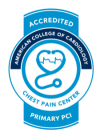KCH is nationally recognized for its commitment to providing high-quality stroke care
Knox Community Hospital’s Stroke Program has received the American Heart Association’s Get With The Guidelines® - Stroke Silver quality achievement award for its commitment to ensuring stroke patients receive the most appropriate treatment according to nationally recognized, research-based guidelines, ultimately leading to more lives saved and reduced disability.
Know How to Care for Your Heart
List to Dr. Barry George on WCLT T100
Early Heart Attack Care (EHAC)
Early Heart Attack Care (EHAC) is an important initiative to reduce heart muscle loss in patients with critical heart conditions.
What is EHAC?
- Early Heart Attack Care (or EHAC) education teaches you to recognize the early signs and symptoms of a heart attack. Why? We want you to become an active bystander so you can save a life - even if it’s yours.
- About 750,000 people in the U.S. have heart attacks each year. Of those, about 116,000 die.
- Many of these patients experienced early symptoms.
Learn the EARLY SIGNS & SYMPTOMS
Someone might have one or more of these common symptoms. When they start, they can be mild or come and go. Over time, the symptoms and pain become more intense. Stay alert and always pay attention to chest pressure.


Physicians

Alix J. Tercius MD, FACC, RPVI joined the Department of Specialty Care-…

Barry S. George MD joined the Department of Specialty Care- Cardiovascular…
Advanced Practitioners

Misty Bailey is a Cardiology Nurse Practitioner.
Misty grew up in Bellville and has been…





